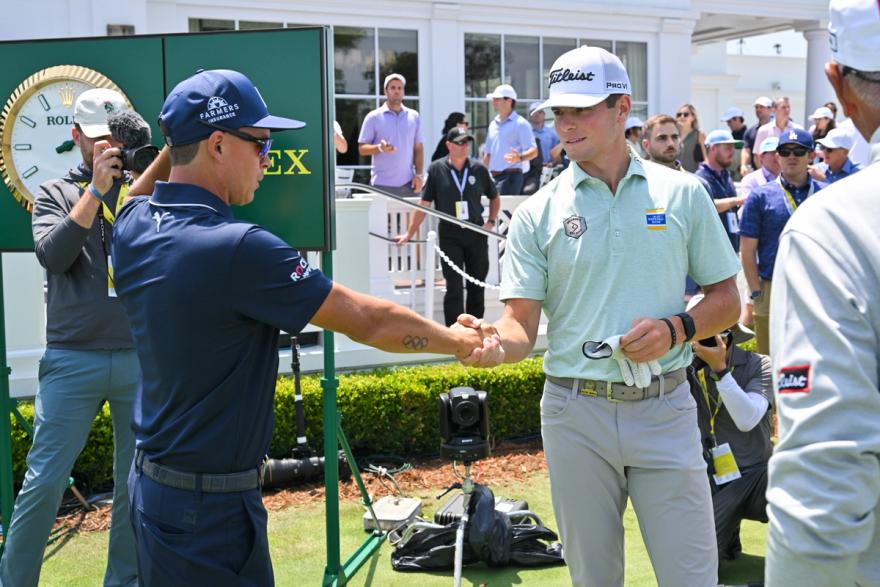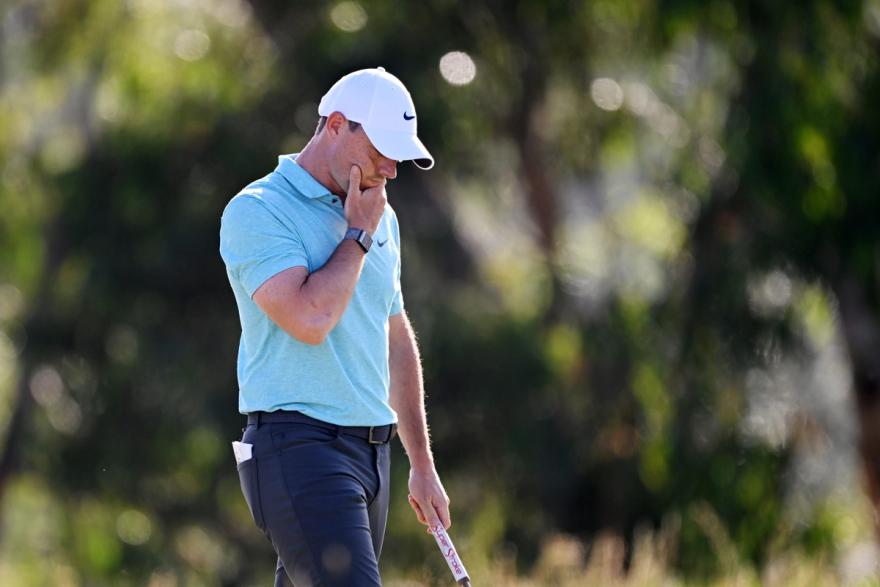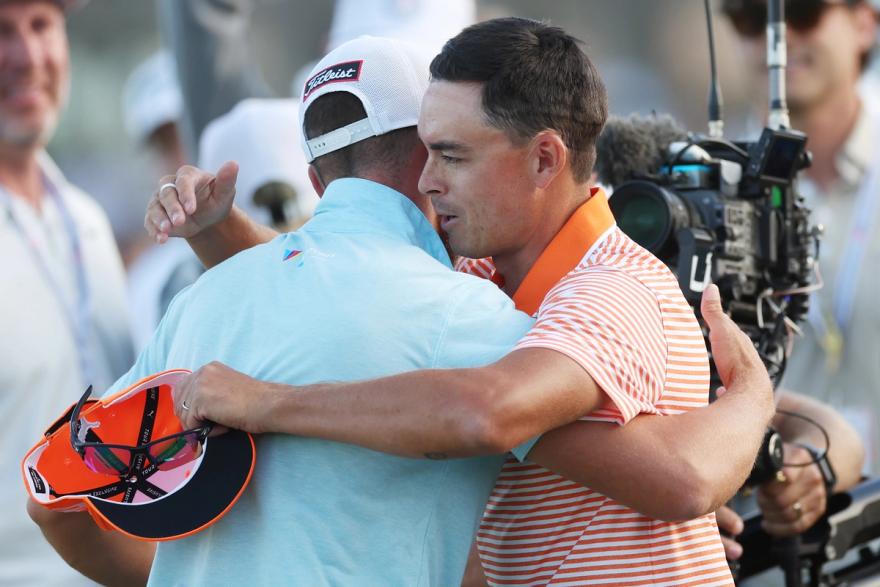LOS ANGELES — Ten minutes before his Sunday tee time in the U.S. Open, Wyndham Clark was still hitting balls on the range of Los Angeles Country Club. Every few seconds, his caddie would flip him a ball and he would blast it 330 yards into the ether, but he wasn’t visualizing shots or going through his routine. His brain was racing.
Rickie Fowler, Clark’s playing partner, was already making his way up the hill toward the first tee, but Clark remained at the end of the range. He needed more time before facing the moment. A few feet away, Julie Elion, a sports psychologist Clark has been working with, stood just outside of his divots and peppered him with questions.
“We were talking about anything but golf,” Clark said. “We were talking about traveling. We were talking about the beautiful homes out here. She was just trying to keep it light. She has a great calmness and presence about her.”
Clark wasn’t sure about Elion six months ago when his caddie, John Ellis, and his agent Rob Mougey, asked him to consider working with her. He didn’t love the idea of being analyzed. But he was so grateful once he got to know her and began to trust her. Before he went to the first tee, she reminded him of a mantra they’d discussed.
“Every time you hear someone chant ‘Rickie!’ think of your goals and get cocky and show them who you are.”
Clark said he reminded himself of the mantra more than 100 times on Sunday. An hour after winning the U.S. Open, he was still stunned by how much it had helped.
“Maybe someday they’ll be chanting my name,” he said.
****
Every major championship begins to fade in my mind once the trophy gets handed out. The weeks, as wonderful as they often can be, begin to blur. Details get sanded down in my mind, and the specifics start to dissolve. I know, for example, Jon Rahm won the Masters (duh), and I can picture the shot he hit to essentially seal the tournament, a chippy 8-iron from the right rough on the 14th hole that curved in the air, peeled off the slope in the middle of the green and curled to four feet. I was standing 20 feet from him when he hit it. That is seared into my brain.
But Rahm’s lesser moments of that week, I’d need to check the tape to get right. Did he win by four or was it three? Did he go for the 13th green in two, or did he lay up? I honestly can’t remember.
I was struck by something Rory McIlroy said at the U.S. Open this week in an interview with Sky Sports, when reporter Jamie Weir asked him if his 2011 win in the U.S. Open at Congressional Country Club felt like a lifetime ago, and that he was almost a different person.
“It does feel like a lifetime ago,” McIlroy said. “I honestly think it’s the best week of ball striking I’ve ever had. I don’t know that I’ve ever hit the ball better than that week and I go back and watch that week a lot because of how well I hit it. But I think this is what makes me feel old: I’ve started to just remember watching the highlights rather than remembering what actually happened.”
I wanted to remember the 2023 U.S. Open for what actually happened, not just watch the highlights someday, so I spent the week with my notebook in hand, jotting down the scenes I longed to preserve.
Clark nervously preparing for the biggest round of his life on the driving range took on a greater importance after he hoisted the trophy, but even if he hadn’t emerged victorious, it still would have resonated with me. For all the brilliance that was on display during the week, we wouldn’t care if it was robots hitting the shots.
The little glimpses of humanity and vulnerability are what make golf worth investing in.
***
When Michael Brennan dressed up as Rickie Fowler for Halloween in 2012, he wasn’t expecting to get anything out of it. He was just a 9-year-old kid who loved golf and thought Fowler was the coolest. But his father had a friend who knew someone who worked for Fowler, and eventually, a picture of Brennan decked out in orange and wearing a wig made its way into Fowler’s hands. Fowler autographed it with a promise: “To Mike. Look forward to playing a practice round with you at the 2025 U.S. Open! Keep up the good work!!”
Eleven years later, Brennan — now a senior on the golf team at Wake Forest University — qualified for the U.S. Open. He beat Fowler’s offer by two years. When Fowler found out via his agent, he wanted to make good on the promise, so he invited Brennan to join him for a Tuesday match against Fowler’s friends, Justin Thomas and Jordan Spieth. It was a reminder, to Fowler, that life can come full circle. As a kid, he’d once dressed up as Fred Couples for Halloween, and gotten to play with him when he turned pro. The least he could do was pay it forward.

Few little boys get to live out their athletic dreams, but Brennan is one of them. He and Fowler came to the 9th hole at LACC, a tricky Par 3 that plays over a giant section of barranca, with their match against Spieth and Thomas tied. This was the last hole. Brennan hit a towering iron shot that settled 15 feet below the pin, and when Fowler missed the green, it was up to Brennan to close it out.
As the players crossed the bridge to read their putts, a small group that included Fowler’s wife, Alison, Thomas’ wife Jillian, and Spieth’s wife, Annie, gathered behind the green to watch.
Brennan studied the line, wiggled his feet and sent the ball rolling. Seconds after it dripped into the hole for the win, Fowler’s daughter, Maya, dashed onto the green and plucked the ball out of the cup. Everyone chuckled.
For the next 10 minutes, family bedlam broke out. Maya Fowler and Sammy Spieth, Jordan and Annie’s son, toddled around the green, their fathers beaming with affection. Eventually, Spieth crouched down to give Sammy a gentle putting lesson. Maya Fowler, wishing she could stay longer, maybe forever, began to cry as she was scooped up by her mom.
“Hey, it’s okay,” Rickie Fowler said, soothing his daughter as they walked.
He waved goodbye to his friends.
There would be plenty of golf to come. It was time to go be a dad.
***
I knew I wasn’t going to be home for Father’s Day this year because it always falls on the Sunday of the U.S. Open, so I made a promise to my 11-year-old daughter, Keegan. If she came up with a question, I’d ask it to her favorite player, Rory McIlroy, then report back with an answer. She agonized over what to ask before settling on something, and I tucked it away, saving it for the right moment.
On Tuesday, I walked a few holes with McIlroy during his practice round. As he studied the course, we chatted about the framework agreement between the PGA Tour and the Public Investment Fund of Saudi Arabia, about Succession and Ted Lasso, and about our families. Practice rounds can be slow, particularly at the U.S. Open. Eventually, in the middle of the 16th fairway as McIlroy waited for the group ahead to clear the green, I posed my daughter’s question.
Would you rather make 20 holes in one playing by yourself, or one hole in one playing with your friends?
Mcllroy mulled it.
“I think I’d have to go with a hole in one in front of my friends,” he said.
I agreed it was the correct answer.
Who, after all, would ever believe you if you said you made 20 holes in one by yourself?
“My first hole in one, I was actually playing by myself,” McIlroy admitted. “I went running back up to the clubhouse at Holywood Golf Club to tell everyone.”
Did they believe you, I asked.
They did, he admitted. He was, after all, a pretty good player as a kid.
How old were you, I wondered.
“I was eight,” he said. We both chuckled.
When I relayed the story to my daughter over FaceTime, she grew wide-eyed with wonder. (We both love that she has freckles, just like McIlroy.) She said the story made her want to practice more.
It’s a shame, I realized, you can’t bottle up your golfing innocence and keep it forever.
***
Wyndham Clark used to hate it when people said nice things about his golf swing. He was outwardly polite, but inside he seethed.
“My first few years on TOUR it actually really bothered me because people would say, oh, you have such a great swing, and I didn't know where the ball was going, and that was really frustrating for me,” Clark said.
He had a lot of anger inside him, and even though he understood it was connected to losing his mom, Lise, to breast cancer when he was in college, he still didn’t know how to deal with it.
“I've had many times where I've gone home and was yelling in my car and punching things and just so mad that I'm like, ‘Why can't I do what my peers are doing?’ ” Clark said.
There was a time when he would break clubs and storm off courses. He didn’t get mad, however, when it felt on Sunday like his whole tournament might be unraveling. On the 8th hole, a reachable Par 5, he missed the green by a yard with his second shot, but his ball was buried in a bush and he could barely see it. When he tried to chip it out, his wedge slid right under the ball, and it barely moved. His two-shot lead in the final round of the U.S. Open looked fragile.
“The tough thing was, I couldn’t see where I was hitting,” Clark said. “The lie was not bad, but I couldn’t see.”
His mind was racing. He took another swipe at the ball and it rocketed across the green. The crowd gasped in a combination of sympathy and shock.
“I didn’t even know where it went,” Clark said.
Remarkably, he didn’t panic. He assessed his chip, nipped it perfectly, and got up and down for bogey.
“That’s momentum,” Clark said. “Even though I made a bogey and it looked like I should have made a birdie or par, making bogey there didn't kill me and kept me in the tournament. That was a huge point in the round.”
***
The wind was swirling. Rory McIlroy wasn’t sure what to do. He was standing on the left side of the 14th fairway, trying to assess which wedge to hit from 125 yards. He was torn between a sand wedge and a gap wedge. He talked it over with his caddie, Harry Diamond, before settling on his choice. He was trailing Clark by a shot and running out of holes. This was a moment.
“As I was walking up to it, it felt like it was a perfect full sand wedge,” McIlroy said. “Hit it hard, get some spin on it. Then while we were getting prepared for the shot, the wind started to freshen a little bit. Full sand wedge wasn't getting there, so I said to Harry, three-quarter gap wedge would be perfect.”
Even when the ball was still in the air, he knew he had made a mistake. The wind was hammering it, and his swing had been a bit tentative. The shot came up nearly 10 yards short and plugged in the grass face of the bunker. His best chance to make a birdie on the back nine had disappeared. Minutes later — after a frantic search for his ball resulted in a fortuitous free drop when Scottie Scheffler found where it had embedded — McIlroy missed a par putt. He could only look on in anguish from the 15th tee box as Clark roasted a 3 wood onto the green to set up an easy birdie.
The wedge, in the end, is what will sting for a bit.

“I feel like I didn't time the shot perfectly,” McIlroy said. “I hit it when the wind was at its strongest and the ball just got hit a lot by the wind, and obviously it came up short. If I had it back, I think I had the right club and the right shot. I might have just had to wait an extra 15 or 20 seconds to let that little gust settle.”
***
Clark let loose a roar when he tapped in on 18, and then he started sobbing. He covered his face with his hat, and then he put his arms around his caddie, John Ellis, and sobbed on his shoulder. It was impossible to hold anything back.
He’d just won the U.S. Open with a par, and when he looked up into the sky, he was thinking about his mom, Lise.
He’d been thinking about her all week, about how it might be kismet that the U.S. Open was in Los Angeles. She had lived here many years ago, and all week people were coming up to him and telling him stories about her, showing him pictures of her, stuff he never knew. Clark’s parents had even gotten married at Riviera Country Club, not far from LACC. Maybe this was destiny.
He also kept thinking about something she’d said when she got sick: Play for something bigger than yourself.
“All I really wish is that my mom could be here and I could just hug her and we could celebrate together,” Clark said. “But I know she's proud of me.”
It had taken him a long time to get over her death. He’d come close to quitting golf several times, but he kept going because of her, and the belief she wouldn’t want him to quit.
“She was so positive and such a motivator in what she did,” Clark said. “She'd be crying tears of joy. She called me 'Winner' when I was little, so she would just say, "I love you, Winner."
***
Rickie Fowler is the kind of friend everyone wishes they could have in life. I used to think it was corny that he waited greenside to congratulate his friends when they won majors, that he was thirsty to share in their success, but now I realize how badly I misread those situations. He is the kind of person who, even on his most disappointing day, wants you to feel appreciated.
After Fowler got done chatting with McIlroy, he did his own press conference. He was disappointed with his play Sunday, but not throughout the tournament. He told a story of how he saw his daughter, Maya, before he went into scoring, and that helped erase some of the sting.
“She could care less if I shoot 65 or 85,” Fowler said. “I was excited that she was able to stay up. We pushed her past her bedtime.”
When he exited the press conference, Fowler bumped into Clark, who was carrying the U.S. Open trophy. He’d just come from the ceremony on the 18th green. Fowler offered up a fist bump.
“Hey, it's your turn to have this next year,” Clark said.
Fowler smiled. “Hey, how does it feel?” he asked.
Clark took a half second to think about it.
“It feels amazing,” he said.

***
Rory McIlroy looked my way for the final question of his post-round press conference. I had raised my hand, and had been handed the microphone, but someone else asked my question while I was waiting. When the moderator called on me, my mind went blank. I blurted out what popped into my mind: Is it starting to get exhausting to keep answering questions about your failures?
He offered up a wistful smile.
“It is, but at the same time, when I do finally win this next major, it's going to be really, really sweet,” he said. “I would go through 100 Sundays like this to get my hands on another major championship.”
As he exited the room, McIlroy bumped into Fowler, who was waiting patiently to talk about his own disappointing day. The two friends share a hug, and then McIlroy departed, weaving his way through a mishmash of media, volunteers, security and LACC members.
Later a friend texted me what he’d heard McIlroy say to his manager, Sean O’Flaherty, as they walked into the press conference.
“St. Andrews all over again.”
Kevin Van Valkenburg is the Editorial Director of No Laying Up.
Email him at kvv@nolayingup.com